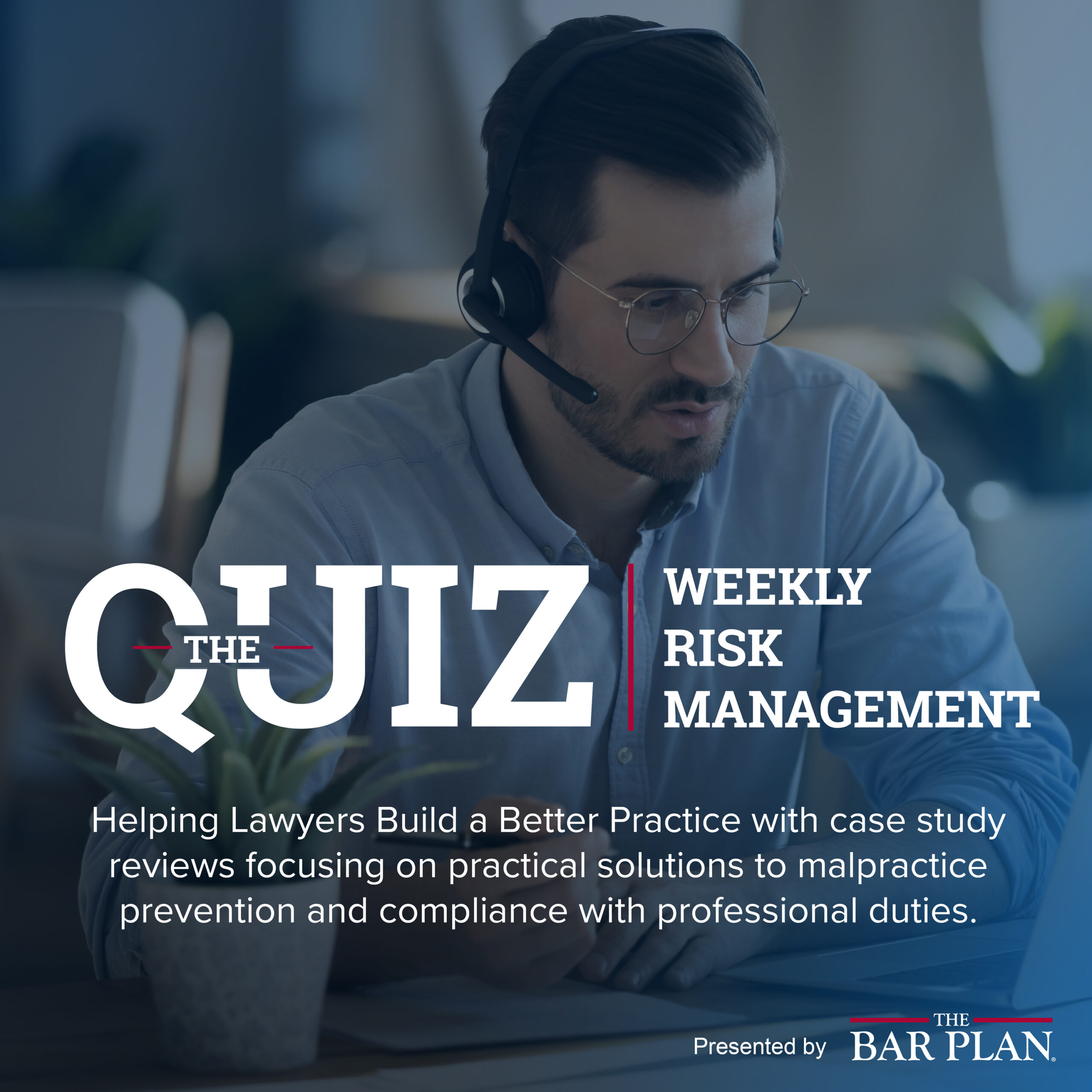QUESTION:
At the conclusion of a personal injury matter, a client requests your assistance with utilizing her recovery to negotiate and resolve certain debts. As part of this work and with client’s informed consent, you issue a check for $235.00 from your trust account to a third party to satisfy client’s debt with that individual. Years later, the $235.00 check is still uncashed according to your trust account records. You: A. May presume that the now stale check cannot be cashed, and should adjust the trust account records accordingly to ensure a balanced account. B. Shall presume that the funds have been abandoned by the third party and issue a payment to the client for that amount because those funds now belong to the client. C. May ignore the uncashed check because it is for a nominal amount, and should adjust the trust account records accordingly to ensure a balanced account. D. Shall make appropriate efforts to contact the third party payee, and, if the payee cannot be contacted, follow the requirements of your state’s unclaimed trust account property requirements.CORRECT ANSWER: D.
Shall make appropriate efforts to contact the third party payee, and, if the payee cannot be contacted, follow the requirements of your state’s unclaimed trust account property requirements. According to a recent New Hampshire Bar Association Ethics Commission Opinion, attorneys have a duty to attempt to locate the payees of uncashed checks, regardless of the dollar amounts or the length of time the checks have gone uncashed. See N.H. Bar Ass’n Ethics Comm. Op. #2020-21/01, 11/24/20. These duties arise from New Hampshire Rule of Professional Conduct 1.15: Safekeeping Property and Supreme Court Rule 50: Trust Accounts. These two rules set forth the requirements of attorneys regarding the receipt, maintenance and distribution of funds belonging to clients and third parties. Though the specific technicalities of appropriate lawyer trust accounting vary from jurisdiction to jurisdiction, every state has similar rules which govern what attorneys can do with these funds and how. The opinion notes that New Hampshire trust accounting rules require attorneys to maintain copies of monthly reconciliations of the client trust accounts, demonstrating a duty to conduct monthly reconciliations. It follows that these monthly reconciliations would reveal the existence of uncashed checks. Additionally, the opinion points to an attorney’s duty under the trust accounting rules to “resolve any trust fund issues expeditiously” based upon the requirement that attorneys in receipt of client or third party funds “shall promptly notify” the appropriate party and that attorneys “shall promptly deliver” client or third party funds to the person entitled to receive them. Essentially, the requirement for periodic account reconciliation imposes a duty to identify uncashed checks and the notification and delivery requirements impose a duty to follow up with the payee. The opinion also analyzes who actually has an ownership interest in the funds. Though New Hampshire has laws that relate to when checks become “stale,” the law states that banks may still charge their customer’s accounts in good faith for payments made after the “stale dated” period. Additionally, the opinion notes that statute of limitations deadlines are also not helpful because these are affirmative defenses which must be raised against enforcement, not laws which extinguish the claims outright. Therefore, the opinion finds that “unless and until the payee affirmatively relinquishes the claim, the right remains with the payee.” If every attempt is made to locate the payee and he or she cannot be located within a prescribed amount of time, the opinion directs New Hampshire lawyers to follow the requirements of the state unclaimed property act. While following the unclaimed property act requirements is a common approach to resolving this issue, other states may require lawyers to deposit the funds with the state’s client protection fund. See, e.g. Tennessee Rule of Professional Conduct 1.15(f) and Comment [14]. The opinion also suggests that attorneys should keep detailed records of all attempts to contact the payee in these situations to demonstrate a good faith attempt to locate him or her if it becomes an issue later. Lastly, the opinion cautions that attorneys should only take appropriate steps in these situations. Do not be tempted to withdraw the cash in the amount of the check and mail that amount to the payee or otherwise use transfers to “clean up” the balance. The rules require that “withdrawals shall be made only by check payable to a named payee and not to cash.” If you find yourself with outstanding checks from your trust account, you should carefully analyze the trust accounting rules in your jurisdiction to ensure compliance with the rules of professional conduct before disposing of or distributing any funds.Malpractice Insurance : Not All Policies Are The Same
Lawyers' Malpractice Insurance can be complicated and nuanced. In this explainer video we unpack an important policy differentiator that may save you money and protect your practice in the long run: Extended Reporting Coverage.Want more Risk Management Content?
CLICK HERE TO GET RISK MANAGEMENT CONTENT SENT TO YOUR EMAIL.
